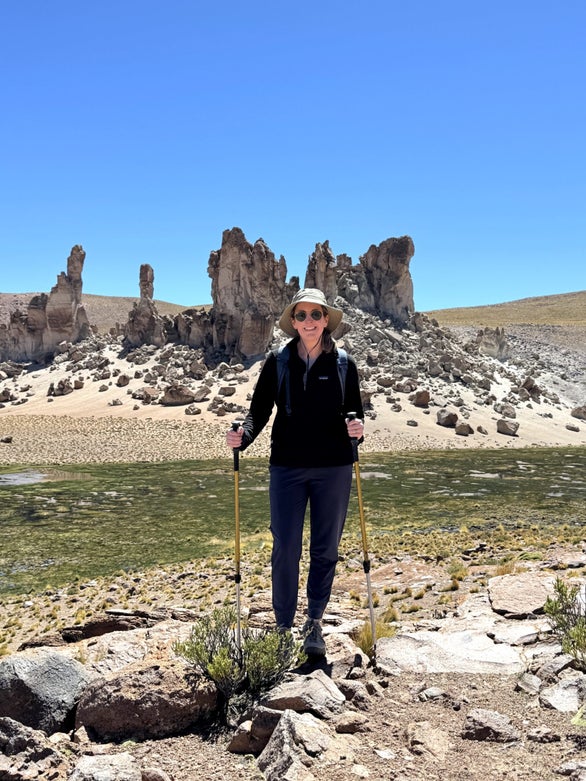Profound silence on the tundra in sub-Arctic Canada, the gunshot of a calving glacier heard from a tent in Greenland’s backcountry, the reflection of snow-crowned peaks in a mirrored lagoon in the high plateau of Bolivia. Some of my most awe-inspiring travel experiences have been in the vast wilderness, where I felt humbled by the scale of time and space while simultaneously more connected to the natural world.
I’ve rounded up ultra-remote places to stay around the world where you can feel the same pull of the wild. Whether these adventures inspire introspection or not, their wow factor is undeniable, from a five-room lodge in the middle of a glacier, to a mountain biking mecca on the rim of “Africa’s Grand Canyon.” And while these lodges might not be the most accessible due to the effort they require to get there—not to mention the sometimes steep cost—the sublime solitude alone makes these once-in-a-lifetime journeys worth it.
Dreaming of an adventure in some of the planet’s most remote stretches? These are nine of the wildest lodges and camps in the world where you can truly get off the grid.
Sheldon Chalet, Alaska
It’s just you and miles of snow, ice, and starry skies at Sheldon Chalet, an intimate, fly-in lodge perched on a razor-sharp ridge in the middle of Ruth Glacier in Denali National Park. The nearest town is 50 miles away, and there’s no cell service, WiFi, or TV, only limitless views of snow-encrusted Denali and the white expanse of the glacier outside your window. With only five bedrooms in the chalet, you’ll feel like you have this pristine wilderness to yourself.
The spirit of adventure has been part of the lodge since its early days (read our review of Sheldon Chalet here). After helping to map much of the Alaska Range, aviator and explorer Don Sheldon and his wife, Roberta, built the “Mountain House” on the lodge’s current site in 1966 as a refuge for alpinists, skiers, and intrepid travelers who wanted to experience the majesty of Denali. The couple’s children ushered in a new era for this remote escape when they opened the luxury Sheldon Chalet in 2018. While the helicopter arrivals christened with champagne and oysters are a far cry from the chalet’s humble mountain hut beginnings, the legacy of rugged adventure remains.
Adventure intel: A stay here is all about ski-touring and snowshoeing across the Ruth Glacier in the shadow of mythic Denali or repelling into its luminous blue crevasses. From fall through spring, head out on a full moon glacier trek or witness rippling electric green and pink northern lights, then warm up around a bonfire or in the sauna. In the summer months, turquoise pools bloom on the glacier’s surface and the boom of far-off avalanches thunders across the white wilderness.
How to get there: Reach the town of Talkeetna via a two-hour drive from Anchorage and then board a helicopter for the 30-minute flight to the chalet. You can also opt for a 1.5-hour airplane flight from Anchorage. Both options are included in your stay, along with all meals and experiences. From $4,250 per person, per night for an all-inclusive trip with transportation from Talkeetna or Anchorage.
Ungava Polar Eco-Tours Camp, Canada
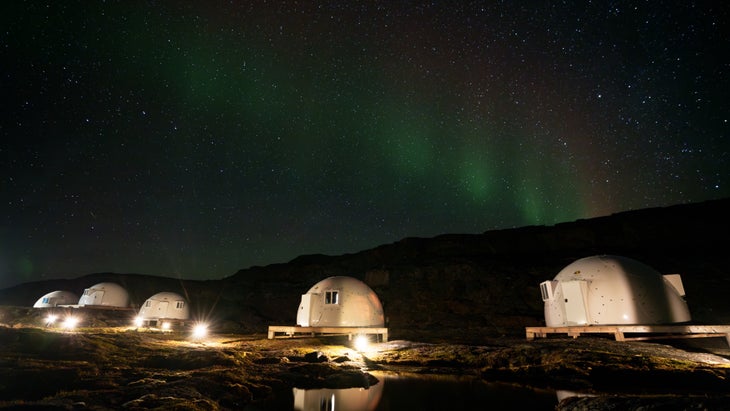
Even in some of the quietest natural havens in the world, there’s the hum of insects, water caressing a shoreline, or the unfortunate buzz of a rogue drone. But as I laid on my back gazing up at the cloudless blue sky during a fat-biking break in Nunavik—the northernmost part of Quebec just below the Arctic Circle—I couldn’t even hear a whisper of wind. This rare, precious silence was part of what drew Jonathan Grenier and James May, the founders of Ungava Polar Eco-Tours, to set up the company’s outdoor adventure base camp here.
The ecotourism company is the first 100 percent Inuit owned and operated business of its kind in Nunavik, and brings travelers to the uninhabited Gyrfalcon Islands. Set on the shores of Ungava Bay on postage-stamp Tiercel Island, the camp is marked by five cozy heated domes that echo traditional igloos and can withstand the island’s tempests and as well as any curious polar bears. When I visited during their inaugural season in 2024, the first autumn chill had turned the sub-Arctic tundra into a fiery patchwork of orange and umber. We explored and motored around by boat, with the waterways entirely to ourselves, learning about Inuit culture and tradition along the way.
Adventure intel: Days here are spent wildlife viewing while exploring the land on a fat bike or on foot on guided interpretive hikes. If you visit in late summer or early fall, the tundra turns into an all-you-can-eat berry buffet, where tart, juicy crowberries and cloudberries provide the perfect mid-hike snack. Head out onto the water to sail around the archipelago, keeping your eyes peeled for breaching minke whales and bearded seals, as well as shaggy muskoxen—one of the few megafauna to survive the Ice Age—and Arctic wolves patrolling the shoreline.
How to get there: A week-long stay includes all flights, including from Montreal north to Kuujjuaq, the largest town in Nunavik. From there you’ll catch an Air Inuit charter flight to Tiercel Island where you’ll land on the tundra runway, but not before getting a fantastic bird’s-eye-view of camp from the bush plane. From $10,500 per person for an all-inclusive, seven-night trip with flights from Montreal.
Ramaditas Mountain Lodge, Bolivia
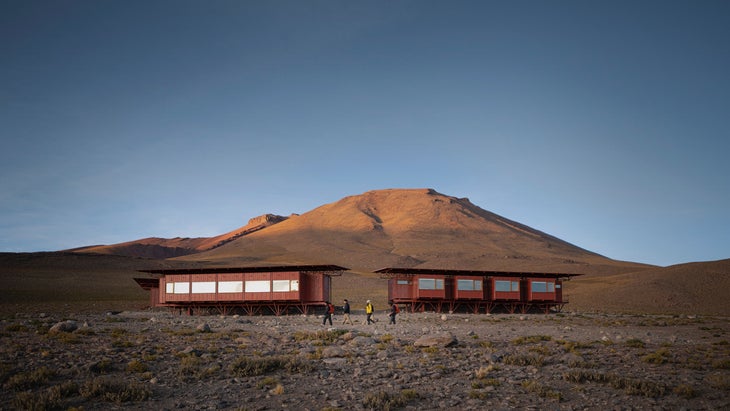
“You travel from Mars, to Earth, to the moon on this trip,” said my guide Aida Belen, referring to Explora’s week-long Travesía, an adventure-packed, private overland journey. The trip traces a route from the Martian Atacama Desert to Bolivia’s lunar Uyuni Salt Flat following the Qhapaq Ñan, a network of ancient Incan roads that spans six countries and nearly 19,000 miles. But as our jeep rumbled down a steep dirt road, obscuring a herd of vicuna in a veil of dust, Bolivia’s Ramaditas Lagoon below looked as otherworldly as the two iconic destinations that bookend the journey.
Ramaditas sits on the edge of the mirrored lagoon at over 13,000 feet, and is one of two mountain lodges set in remote locales along the Travesía’s Altiplano section. Designed by Max Núñez, the minimalist, stilted lodge has just four rooms that overlook the lagoon, and in the distance, snow-capped mountains and Bolivia’s dramatic, barren plateau. Adventures abound in the region, and at night, a rainfall shower, glass of smoky carménère, and a modern room clad in warm mani wood with a picture window await.
Adventure intel: Hiking and mountain biking across the windswept plateau are the main draw in the region and a five-mile trek in Pastos Grandes is a highlight (which feels a lot longer at 16,000 feet). Weave through boulders and around desert plants to reach ancient pictographs emblazoned on the walls of skyscraper-high yardangs (tall rock formations sculpted by the wind), before catching your breath during a picnic lunch.
How to get there: The guided overland journey begins in San Pedro de Atacama, Chile, a two-hour flight from Santiago. The Jirira Lodge, which overlooks the Uyuni Salt Flat and marks the end of the Travesía can also now be booked independent of the overland trip. Joya Andina in Uyuni is the closest airport to Jirira Lodge and is a 1.5-hour drive across the salt flat during the dry season, from April to November, or a five-hour drive around it during the wet season, from December to March. From $8,500 per person for an all-inclusive, seven night trip excluding flights.
Three Camel Lodge, Mongolia
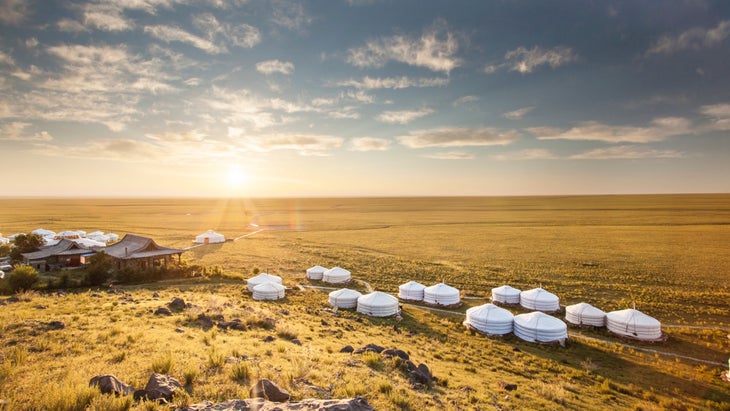
Mongolia is one of the most sparsely populated countries on Earth, and in the heart of the Gobi Desert, a vast 500,000-square-mile expanse of wilderness, sits Three Camel Lodge. Nestled at the foot of Bulagtai Mountain, each cozy, wood stove-warmed traditional ger (a Mongolian yurt-like dwelling) opens out onto the endless steppe, where wind whispers through sunbaked grasses. Hidden in this ancient landscape are Bronze Age petroglyphs and a geological and paleontological history even older.
Part of the Beyond Green collection, the property was founded on a vision of preserving the land, wildlife, and nomadic culture and traditions of Mongolia’s people. So, while this is likely one of the most remote locales on Earth for a lodge, every guest is immersed in local culture, food, and storytelling through visits with nomadic families—with wild desert adventures on your doorstep.
Adventure intel: Head out on a hike through the cinnamon-hued Flaming Cliffs, an iconic site in the Gobi Desert and one of the world’s most important paleontological sites (dinosaur eggs were first discovered here in 1923), or embark on a trek through the green Yol Valley National Park, a tapestry of sparkling streams and wildflowers. Horses are an important part of Mongolian culture throughout history and into the present. Saddle up to visit a nomadic family and get a look at their culinary and artisan traditions inside their home or try your hand at Mongolian archery.
How to get there: Travelers can reach Three Camel Lodge via a 1.5-hour flight from Ulaanbaatar to Dalanzadgad, located on the edge of the Gobi Desert. There, a 4×4 vehicle awaits to ferry guests along a scenic one-hour drive to reach the lodge. From $4,915 per person for two nights.
Kongde Lodge, Nepal
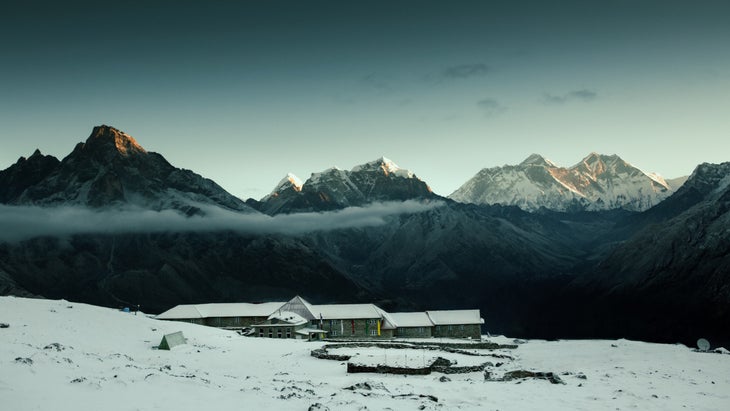
The trek to Everest Base Camp, a place steeped in the spirit of mountaineering expeditions both infamous and celebrated, is still one of the world’s most celebrated adventures. While making the journey to camp at the foot of the Khumbu Glacier has drawn criticism in recent decades for being overcrowded and unsustainable on multiple fronts, Mountain Lodges of Nepal offers a way to traverse this storied landscape in a way that’s gentler on the environment and local communities.
Their 12-day Everest Base Camp Trail trip begins at 9,300 feet in Lukla and ends with a helicopter ride into camp surrounded by the staggering beauty and scale of the nearly mythical, snow-shrouded mountains. Along the route, trekkers engage with local culture and stay at the mountain lodges that dot the trail, including Kongde Lodge. Sitting at nearly 14,000 feet, this is the highest-altitude lodge on the trip and the most remote, hours away from the usual tourist circuit. Cradled by mountains with sweeping views of the Khumbu Valley and Mount Everest in the distance, the scenery and solitude here is unrivaled in the region.
Adventure intel: The week-long journey on foot through the high Himalayas to reach Kongde Lodge will take you through small Sherpa villages and over high suspension bridges. You’ll wind through fragrant fir and rhododendron forests and visit the world’s most remote monastery. Central to the trek is connecting with the region’s Sherpa people, and learning about their culture through song, dance, and food. After two nights at the lodge, a short but cinematic helicopter flight marks the last leg to base camp.
How to get there: A helicopter flight from Deboche Lodge, which is reached on day six, whisks you up to Kongde Lodge, where, far away from the “Everest Highway,” you’ll refuel with champagne breakfast in the clouds on arrival. From $9,800 per person.
Sal Salis Ningaloo Reef, Western Australia
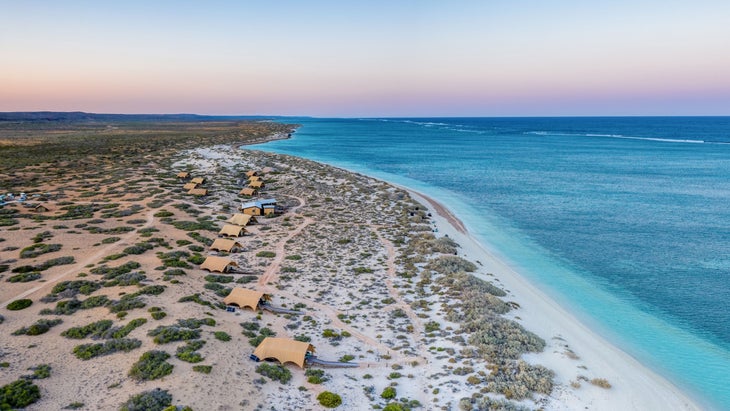
Australia is home to some of the most far-flung, primordial swaths of wilderness in the world, and on the coastline of Western Australia, almost 800 miles north of Perth, sits Sal Salis. The secluded safari-style camp rests in bone-white dunes that hem the brilliant turquoise lagoons of Ningaloo Reef, a UNESCO World Heritage site. Wake up to birdsong and drift off to the ocean waves in a breezy tent—one of only 16 and the only property around for miles, meaning you’ll have beach stargazing almost to yourself.
The waters here are home to spectacular marine wildlife, including humpback whales, manta rays, sea turtles, and one of the largest aggregations of whale sharks in the world, making this spot a Shangri-La for ocean lovers. Each year between March and August and October, whale sharks migrate past Ningaloo Reef, congregating in great numbers, and a stay here offers the rare opportunity to responsibly swim alongside the majestic giants. From July to August, you can also swim with humpback whales as they make their way back down to the Antarctic.
Adventure intel: Swimming alongside whale sharks and humpback whales is one of the most moving wildlife experiences Australia offers, but snorkeling, scuba diving, kayaking, and stand-up paddle boarding are also on the menu. If you want to keep your feet on terra firma for a day, hike through Mandu Mandu Gorge, part of Cape Range National Park just two kilometres behind the camp. Tread through a landscape of craggy limestone and acacia trees steeped in ancient geological history and Aboriginal mythology, with the bright blue ocean in the distance.
How to get there: Sal Salis is an hour drive south from Exmouth in Cape Range National Park. Daily flights run from Perth to Exmouth’s Learmonth Airport. Tents from $650 per night.
Fish River Lodge, Namibia
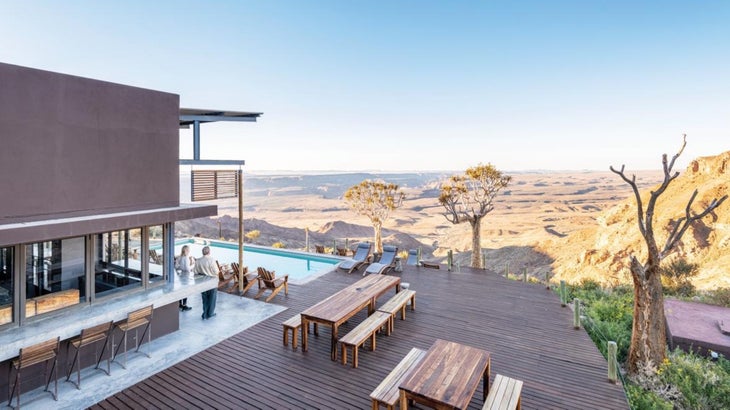
Truly rugged, active adventures are few and far between in Africa, but Namibia offers remote slivers of desert for visitors who want to see a less-traveled—and sweatier—side of the continent. Among these pockets is Fish River Canyon in the south of the country, Africa’s answer to the Grand Canyon. “Namibia’s relatively low wildlife density and expansive terrain encourages outdoor adventures that go beyond game drives,” says Jeff Stivers, co-founder of Outlier Journeys, a U.S.-based travel company that organizes trips to the region. “Not many people even know about how massive Fish River Canyon is and it’s perfect for people looking to connect with nature in an immersive way.”
The rift stretches for 100 miles and is 1,800 feet at its deepest, and right on the edge is Fish River Lodge, a haven for outdoor adventure. You can take in the view of the chasm from the rim pool with Fish River tumbling along far below and ochre mesas stacked endlessly toward the horizon.
Adventure intel: Set out on morning hikes or mountain bike rides around the rim right from the lodge. As sunrise paints the rocks crimson only the call of baboons echoing between rocky escarpments punctuates the silence. Multi-day biking and hiking adventures are on the table here, too. You can pedal or walk your way to two smaller camps, Camp Eternity and Camp Edge, out in the far reaches of the canyon on two-to-three-day backcountry adventures. The lodge is already one of the most remote in Africa, but you’re nearly guaranteed to be the only one around for miles at these two camps.
How to get there: From the capital city of Windhoek, Fish River Lodge is a full day’s drive south. A 4×4 vehicle is recommended if you’re driving yourself. From $190 per person, per night exclusive of activities. Two- and three-night hiking and cycling packages are also available.
White Desert, Antarctica
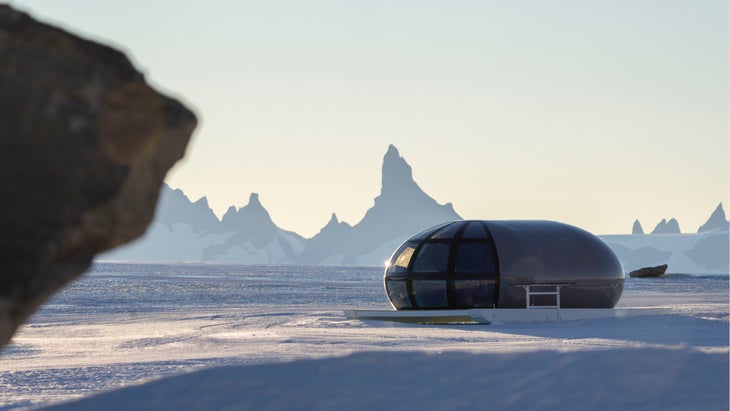
While prone to seasickness, I somehow managed to muster the courage to cross the Drake Passage on an expedition cruise to Antarctica. But if I were to do it again, I’d be inclined to travel with White Desert. Not only do you skip the journey across some of the roughest seas on the planet by arriving on a charter flight from South Africa, but you gain access to the interior of the world’s most remote continent, a part of Antarctica that few see. While icebergs and rocky shorelines dominate the Antarctic coastline that cruise ships navigate, the heart of the continent is another world, one of shimmering blue ice tunnels and crevasses, jagged mountain peaks, and vast moonscapes.
On an east to west traverse of Antarctica in 2005, White Desert co-founder Patrick Woodhead was so captivated by the rugged beauty of the interior that he and his wife, Robyn, were inspired to give other intrepid adventurers the chance to experience it. If the landscape doesn’t feel extraplanetary enough, the two domed camps, Whichaway and Echo, give a nod to the early days of space exploration with a striking futuristic aesthetic and elegant amenities. And while White Desert is a singular luxury experience—rates start at $49,500 per person for a six-day trip—sustainability is at the core of the carbon-neutral company’s ethos. The camps’ design has a light footprint, the company utilizes sustainable aviation fuel, and they’re committed to combating climate change through their conservation arm, White Desert Foundation. The foundation supports Blue Carbon initiatives and climate researchers on the ground in Antarctica.
Adventure intel: Trek through labyrinthine ice tunnels, strap on crampons, and use an ice pick to climb a sheer cliff face, or abseil down a 100-meter cliff surrounded by an incandescent blue amphitheater of ice. Fat biking, skiing, and mountaineering expeditions that traverse remote mountain ranges are also part of the outdoor adventure roster.
How to get there: Aboard a five-hour charter flight, travelers fly from Cape Town into the Antarctic Circle and land on Wolf’s Fang Runway, an ice-hardened private runway. From $49,500 per person for an all-inclusive, seven-day trip with return flights from Cape Town. A one-day trip from Cape Town to Antarctica and back is also available for $15,950 per person.
Nanoq Lodge, East Greenland
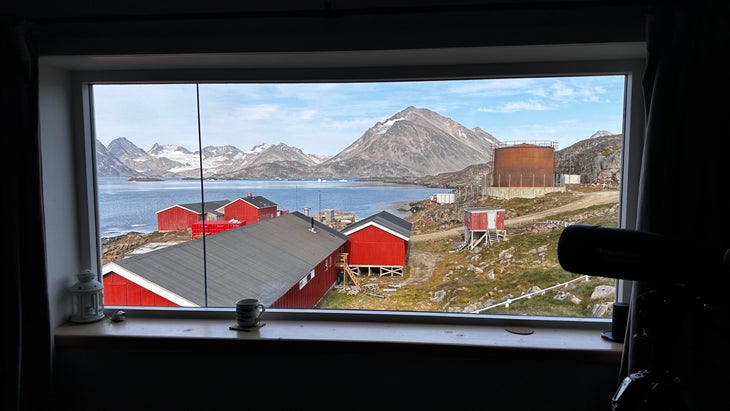
Much like Antarctica, eschewing the cruise ship and opting to get out into the backcountry in Greenland is exhilarating. Certain slivers still feel like some of the last untouched places on Earth. On a week-long, land-based expedition with Hinoki Travels in East Greenland, I trekked across tundra carved with the vestiges of Thule history (the ancient ancestors of the Inuit), and camped on the edge of cobalt fjords with views of glaciers and jagged mountain peaks cloaked in snow. In glacier-carved valleys, the wind carried the smell of ice and taste of the sea, and our small group of seven didn’t come across another soul.
The journey began in Kulusuk, a small Inuit village on an island of the same name just below the Arctic Circle, at Nanoq Lodge. The small, hand-built wooden lodge serves as a home base for intrepid travelers heading out into the wilds of East Greenland with Pirhuk, the ski touring and mountaineering experts that Hinoki partners with to lead trips. While staying here before heading out on our trek, I woke to sled dogs howling into the lonely dawn and a flotilla of icebergs gliding by on the bay. I helped catch Arctic char and forage for sorrel under a bright blue sky, which we enjoyed for dinner after hiking to the island’s hilltop to watch the crayon-box houses aglow at sunset.
Adventure intel: To reach the first campsite on Hinoki Travels’ seven-day trip, I kayaked across Tunu Sound toward Apusiaajik Glacier, escorted by breaching humpback whales. The journey’s two remote campsites are reached by traversing spectacular terrain on foot across glaciers, up icy slopes, and through glittering blue ice caves. In addition to Hinoki Travels’ unique expedition, which weaves local life and culture into the adventure, Pirhuk offers expedition ski touring, trekking, climbing, and kayaking along hundreds of miles of isolated coastline.
How to get there: The island of Kulusuk is reached by a direct flight from Keflavik, Iceland, that’s just under two hours. A 30-minute hike or ski from the small airport brings you down to the lodge on the water’s edge. From $6,750 per person for Hinoki Travels’ seven-night Interdependence: East Greenland trip, excluding flights from Reykjavik.
Chloe Berge is a travel journalist drawn to adventures in the world’s rugged, remote corners, preferably exploring them on foot. Recent stories have brought her into the backcountry of Greenland, across Bolivia’s high plateau, and to Arctic Canada, and she has her sights set on the Himalayas next. She writes for publications including National Geographic, The Globe and Mail, AFAR, Travel + Leisure, and Sierra.
